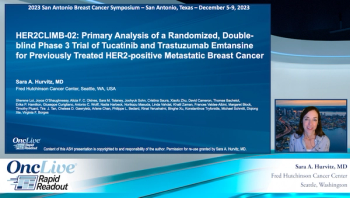
Experts on colorectal cancer discuss the timing of testing for minimal residual disease in the treatment journey.

Your AI-Trained Oncology Knowledge Connection!


Experts on colorectal cancer discuss the timing of testing for minimal residual disease in the treatment journey.

A panel medical oncologists provide an overview of circulating tumor DNA and its role in MRD (minimal residual disease) testing in the treatment of patients with colorectal cancer.

Experts on muscle-invasive bladder cancer respond to recent data in adjuvant therapy that were presented at ASCO GU 2024.

Following an overview of the evolving adjuvant therapy space, Matthew Milowsky, MD, FASCO, reviews recent updates from ASCO GU 2024 in muscle-invasive bladder cancer.

Rahul Banerjee, MD FACP, discusses the FDA’s decision to add a class-wide boxed warning for secondary malignancies on all approved CAR T-cell therapies.

Focusing on neoadjuvant therapy, the expert panel discusses ongoing clinical research in muscle-invasive bladder cancer and the potential role of novel strategies in the treatment space.

A panel of experts on bladder cancer introduce themselves and give an overview of the neoadjuvant therapy landscape for patients with muscle-invasive bladder cancer.

Rahul Banerjee, MD, FACP, discusses the use of nivolumab in multiple myeloma or non-Hodgkin lymphoma after progression following CAR T-cell therapy.

Early data seen with acalabrutinib plus axi-cel indicate the combination’s feasibility as bridging therapy in relapsed/refractory B-cell lymphoma.

Petros Grivas, MD, PhD, discusses 2023 updates regarding the treatment of patients with metastatic/unresectable urothelial carcinoma.

Thomas J. Lynch Jr, MD, details how treatments are evolving for patients with EGFR-mutated advanced non–small cell lung cancer.

Sara A. Hurvitz, MD, presents data from the phase 3 HER2CLIMB-02 study investigating tucatinib and trastuzumab emtansine in patients with previously treated HER2+ metastatic breast cancer.

Petros Grivas, MD, PhD, spotlights key advancements and research in urothelial cancer reported at the 2023 ESMO Congress, detailing findings from the phase 3 CheckMate 901, EV-302/KEYNOTE-A39, and THOR trials.

Petros Grivas, MD, PhD, discusses outcomes associated with the phase 3 CheckMate 901 trial in metastatic or unresectable urothelial carcinoma.

Patients with B-cell malignancies who were intolerant to treatment with acalabrutinib experienced clinically meaningful benefits when treated with zanubrutinib, suggesting zanubrutinib may be a viable treatment option for this population.

The addition of tucatinib to ado-trastuzumab emtansine (T-DM1) significantly improved progression-free survival vs placebo plus T-DM1 in patients with previously treated HER2-positive metastatic breast cancer, including those with brain metastases.

Mazyar Shadman, MD, MPH, discusses the efficacy and safety of zanubrutinib in chronic lymphocytic leukemia, as well as data derived from the agents use which supports the regulatory approval of zanubrutinib in this patient population.

Anna B. Halpern, MD, discusses ongoing efforts to address unmet needs in patients with primary myelofibrosis.

Anna B. Halpern, MD, discusses investigational efforts to utilize ruxolitinib and navitoclax in earlier treatment lines for patients with myelofibrosis.

Petros Grivas, MD, PhD, discusses several unmet needs within urothelial cancer, as well as how to potentially ameliorate them.

MB-106, a first-in-class, CD20-targeted autologous CAR T-cell therapy, led to durable clinical responses with low-grade cytokine release syndrome in patients with indolent lymphoma.

Anna B. Halpern, MD, discusses key efficacy data from the phase 1/2 MANIFEST trial (NCT02158858) investigating the BET inhibitor pelabresib plus ruxolitinib, and highlights the agents clinical significance in patients with myelofibrosis.

Natasha Kwendakwema, MD, discusses findings from a study on the effects of adverse financial events on treatment costs at the end of life and health care utilization in patients with cancer.

Hiba Khan, MD, MPH, discusses how adverse financial events may contribute to the risk of early mortality in patients with cancer.

Catherine C. Coombs, MD, and Alexey Danilov, MD, PhD, moderate a discussion on the role and sequencing of BTK inhibitors, venetoclax-based regimens, and CAR T-cell therapy in mantle cell lymphoma and chronic lymphocytic leukemia.

Closing out their panel on metastatic colorectal cancer, expert oncologists consider ongoing challenges and future evolutions within the treatment landscape.

Anna B. Halpern, MD, discusses symptom control, transfusion independence, and spleen volume findings with the JAK and ACVR1 inhibitor momelotinib vs the JAK inhibitor ruxolitinib and danazol in patients with myelofibrosis with anemia.

Drs Khan and Kwendakwema discuss the methods and design of two studies investigating adverse financial events in patients with cancer, the future implications of these findings, and the importance of continued investigation in this area.

Focused discussion on clinical trial data with trastuzumab deruxtecan in the setting of HER2+ metastatic colorectal cancer.

A panel of oncologists shares comprehensive insight to clinical trial data with tucatinib in patients with HER2+ metastatic colorectal cancer.